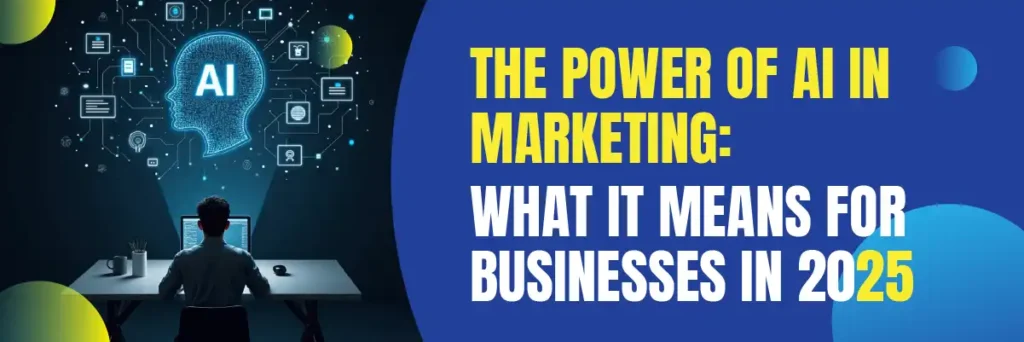
05 January The Power of AI in Marketing: What It Means for Businesses in 2025
With the increasing use of AI, digital marketing is expected to undergo a major revolution in 2025. AI empowers us with the ability to process and analyse increasing amounts of data at the same time, optimising workflow and providing experiences customised to an individual. This blog elaborates on the increasingly essential role of AI in marketing, focusing on the specific use cases of AI where its role is non-negotiable.
How AI Creates Hyper-Personalized Marketing Campaigns
One of AI’s most important contributions to digital marketing is developing highly customised marketing campaigns. Based on their browsing habits, past purchases, and other personal preferences, AI ensures that each user experiences a unique version of the same website tailored to them.
For example, an online store might feature items on its home page and recommend products that customers are more likely to purchase. Even streaming platforms like Netflix and Spotify use this same algorithm to suggest TV shows, films, and songs that appeal to particular users to increase engagement and loyalty.
AI enables personalisation to increase conversion rates and user satisfaction from these websites.
Examples of AI Tools Transforming Data into Actionable Insights
AI in digital marketing enables marketers to predict upcoming trends, ensuring decisions are made based on available data.
- ChatGPT is the most famous conversational AI platform. It can provide customers with relatable content that keeps them engaged.
- Hootsuite Insights: Hootsuite has combined its tool suite and powered it with AI to make a product that helps brands track their social media sentiment and even analyse trends all in one place.
- Optimizely: Optimizely’s A/B testing tools have always been popular among marketers, but with the introduction of AI in their tools, Optimizely has made it easier to determine customers’ hooking points, thus enhancing the average campaign performance.
Such AI tools improve marketing tactics, convey targeted messages, and increase return on investment.
Benefits of Conversational AI for Businesses
Conversational AI, powered by machine learning and natural language processing, is progressively creating a new way for companies to communicate with customers. Chatbots and virtual assistants, which offer seamless interactions with prompt responses, are more well-known examples of this.
Retail businesses, for instance, can utilise AI chatbots to assist their consumers with product identification, recommendation-making, and even return management.
It’s not just effectiveness; conversational AI lowers expenses, improves customer satisfaction, and makes it easier for companies to grow while automating support services. This is an important selling point, as companies can provide satisfaction with their customer service while keeping organisational growth at the forefront.
Importance of Voice Search Optimization
Voice search optimisation has emerged as a key component of artificial intelligence in digital marketing as smart gadgets and voice assistants like Alexa, Google Assistant, and Siri proliferate.
With conversational voice searches, marketers adapt their strategies to stay ahead of the curve. AI is thus used to analyse these queries and alter their content. And
Voice search optimisation is thus an important part of AI in marketing examples.
What AI in Marketing Could Look Like in 2025
By 2025, artificial intelligence (AI) will play a much larger role in marketing and provide firms with previously unheard-of capabilities. Some expected developments are as follows:
- Improved Predictive Analytics: AI will improve its capacity to predict consumer behaviour, allowing companies to take preventive measures.
- Automated Content Creation: AI can create content in almost all available formats, such as blogs, videos, or social media posts, that are suited to a specific audience.
- Immersion augmented reality (AR) Experiences: AI-powered AR allows brands to offer personalised, interactive purchasing and engagement experiences.
- Advanced Audience Segmentation: AI makes it possible to generate accurate customer profiles from the data and pattern analysis technology available.
As the importance of ethics with AI usage becomes more well-known, long-term success in developing and maintaining customer trust will involve responsible and transparent use of data with AI.
Conclusion
AI enables meaningful interactions and personalised customer experiences to strengthen digital marketing tactics. With its dynamic and essential role in marketing, AI is set to be essential to success in all aspects of marketing.
To set themselves up for long-term success in this digital era, AI cannot be compromised.
WhatsApp us
